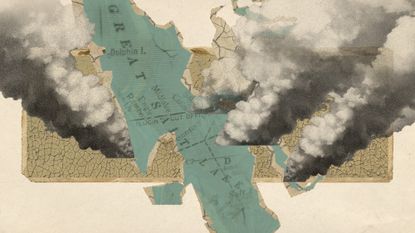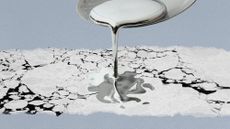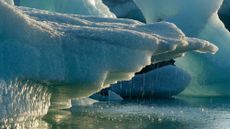The Great Salt Lake is getting less great by the year
Evaporation is wrecking havoc on the local ecosystem


Utah's Great Salt Lake is drying out and releasing greenhouse gases into the atmosphere. The effect of drying lakes has largely not been included in climate calculations, making true emissions levels inaccurate. Salt lakes all over the world are facing similar fates, and the changes are making conservation efforts a priority.
A very salty buffet
A study published in the journal One Earth found that 4.1 million tons of carbon dioxide and other greenhouse gases were released by the Great Salt Lake in 2020, causing a 7% increase in Utah's greenhouse gas emissions and worsening climate change. The lake has been steadily drying, falling to a record low level two years ago. While the water level has rebounded slightly in the past few years, the lake's level remains below what is considered a healthy range.
"Human-caused desiccation of Great Salt Lake is exposing huge areas of lake bed and releasing massive quantities of greenhouse gases into the atmosphere," Soren Brothers, lead author of the study, said in a statement. "The significance of lake desiccation as a driver of climate change needs to be addressed in greater detail and considered in climate change mitigation and watershed planning."
Subscribe to The Week
Escape your echo chamber. Get the facts behind the news, plus analysis from multiple perspectives.

Sign up for The Week's Free Newsletters
From our morning news briefing to a weekly Good News Newsletter, get the best of The Week delivered directly to your inbox.
From our morning news briefing to a weekly Good News Newsletter, get the best of The Week delivered directly to your inbox.
The emissions come from microorganisms releasing carbon dioxide while feeding on materials exposed to the drying lakebed. "Everything that's flowed into that lake over the last 10,000 years or so since it's existed has ended up on that big lake bottom," Brothers said to The Salt Lake Tribune. "It's a huge buffet for bacteria to consume. Suddenly they have access to 10,000 years of deposited organic matter that's been off-limits until then." As the lake dries, more matter is exposed for consumption. Human actions, namely agriculture, are mostly to blame for the drying of the Great Salt Lake. "Upstream water diversions for expanding alfalfa farms and dairies have resulted in less flows into the lake," said NPR. "Utah's rapid population growth has also been to blame."
Lost in calculation
The true magnitude of emissions caused by drying lakes is understated in climate calculations. "They must include the drying lakes in those inventories," Rafael Marcé, a research scientist at the Centre for Advanced Studies in Blanes, Spain, said to The Washington Post. "Because in the case of very big lakes, they could be missing something which is very relevant."
In addition, the loss of water can have major impacts on the surrounding ecosystem. Shorebird and brine shrimp populations have been declining in the region. Dust storms have also increased, worsening air pollution. "Scientists have warned that the lake has high concentrations of neurotoxins and cancer-causing carcinogens — including arsenic and mercury," said NPR.
The good news is that attention has been paid. "For generations, the lake was seen as kind of this dead thing that just happens to be there and will always be there," Utah Gov. Spencer Cox said to NPR. "Now that people are realizing there's a potential that it might not always be here, that's gotten people's attention in a positive way." The Utah state legislature has invested approximately $1 billion in water conservation efforts.
Salt lakes account for approximately 44% of the volume and 23% of the surface area of lakes worldwide. "The significance of lake desiccation as a driver of climate change needs to be addressed in greater detail and considered in climate change mitigation and watershed planning," said Brothers.
Create an account with the same email registered to your subscription to unlock access.
Sign up for Today's Best Articles in your inbox
A free daily email with the biggest news stories of the day – and the best features from TheWeek.com
Devika Rao has worked as a staff writer at The Week since 2022, covering science, the environment, climate and business. She previously worked as a policy associate for a nonprofit organization advocating for environmental action from a business perspective.
-
 What are the lessons from Ukraine's Russia incursion?
What are the lessons from Ukraine's Russia incursion?Talking Points And what do they mean for Putin's red lines?
By Joel Mathis, The Week US Published
-
 Harris claims steadfast values in CNN interview
Harris claims steadfast values in CNN interviewSpeed Read This was Harris' first major television interview since she became the Democratic presidential nominee
By Peter Weber, The Week US Published
-
 Israel, UN agree to Gaza pauses for polio vaccinations
Israel, UN agree to Gaza pauses for polio vaccinationsSpeed Read Gaza's first case of polio in 25 years was confirmed last week in a 10-month-old boy who is now partially paralyzed
By Rafi Schwartz, The Week US Published
-
 The Arctic is a ticking 'mercury bomb'
The Arctic is a ticking 'mercury bomb'An icy prison break is on the way
By Devika Rao, The Week US Published
-
 Bananas have been facing extinction. But maybe not for much longer.
Bananas have been facing extinction. But maybe not for much longer.under the radar Scientists may have a solution for a longstanding fungus problem
By Devika Rao, The Week US Published
-
 Homeowners are getting burned by solar panel scammers
Homeowners are getting burned by solar panel scammersIn Depth One-star reviews for solar companies have increased over 1,000% since 2018
By Justin Klawans, The Week US Published
-
 China's winning battle against desertification
China's winning battle against desertificationUnder The Radar Beijing is using solar power to lead the fight as climate change intensifies the threat
By Chas Newkey-Burden, The Week UK Published
-
 11 looming climate tipping points that imperil our planet
11 looming climate tipping points that imperil our planetThe Explainer New reports detail the thresholds we may be close to crossing
By Devika Rao, The Week US Published
-
 Iceberg A23a is taking a spin
Iceberg A23a is taking a spinUnder the Radar As the iceberg turns, so too does its effect on the neighboring ecosystem
By Devika Rao, The Week US Published
-
 The world's largest tropical wetland is on fire, and under threat from waterway
The world's largest tropical wetland is on fire, and under threat from waterwayUnder the Radar Proposed shipping route through Pantanal in Brazil could dry out biome and worsen devastating wildfires
By Harriet Marsden, The Week UK Published
-
 Why lithium mining has Serbians up in arms
Why lithium mining has Serbians up in armsUnder the Radar Balkan nation has reinstated controversial licence to extract 'white gold' as race for crucial EV mineral intensifies
By Harriet Marsden, The Week UK Published